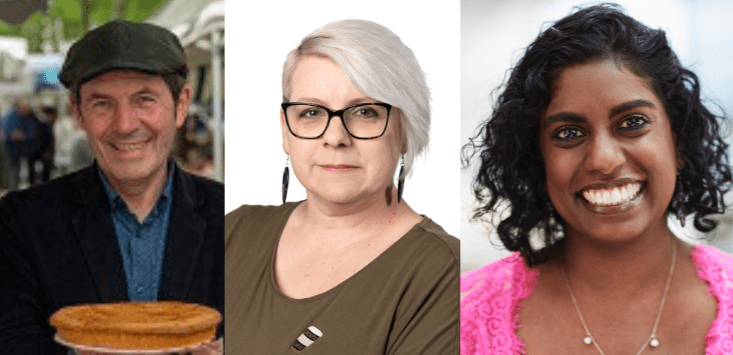
Gabriel Gaté, Chef, Author & Public Speaker; Holly De Rooy, Founder & Director Engage 323 and Malini Raj, Head of Community Engagement Commonwealth Bank
As SMEs transition to a post-pandemic workplace, it’s raising questions around existing processes, workplace culture and ultimately how we can be better. If nothing else, lockdowns highlighted the importance of human connection, which means organisations must create opportunities for those connections to thrive — especially as hybrid work becomes the norm.
In our latest webinar, Why SMEs should embrace cultural diversity in the workplace, our panel of experts discussed why it is so essential to concentrate on cultural diversity, workplace inclusion and employee engagement in 2023.
Diverse backgrounds are a business asset
From startups to multinationals, smart decision-makers are recognising the shift that has occurred in the wake of the pandemic. Employers are no longer running the show when it comes to talent. Instead, it is the candidates who hold all the power, with the prospect of a 20% pay rise a key reason why many skilled workers have been considering a job switch.
So in order to attract and retain the best people in your SME, there must be considerations beyond your traditional list of hiring must-haves. For Malini Raj, head of community engagement at Commonwealth Bank, her perpetual goal is to ensure her people know that their uniqueness is valued and their voice is always being heard.
“In terms of our approach to cultural diversity, our purpose is to build a brighter future for all — our strategies are underpinned by that,” Raj says. “We want to create inclusive workplaces around our values: care, courage and commitment. That allows people to bring their whole selves to work.”
So why, specifically, does cultural diversity matter? Raj says it’s a natural consequence of where we live and who we interact with on a daily basis.
“We live in a multiculturally diverse society,” she says. “The latest Census showed that around 50% of us have one or more parents born overseas. Diversity of perspectives and experiences and backgrounds are an asset, and they can lead to better business outcomes. So it’s really a no-brainer.”
Inclusivity is essential
SMEs that don’t place enough stock in the true value of diversity can end up missing the point entirely. For example, any business can build a ‘diverse’ workplace by making very deliberate hires. You can fill up an office or shop front with lots of different cultures and other areas of diversity, but if your workplace isn’t inclusive of those cultures, you are merely hiring for the wrong reasons.
Two of the elements that Holly De Rooy, founder and director at Engage 23, focuses on with her clients is inclusion and belonging. “I want to foster that common ground and understanding of others,” she says. “Your engagement will be positively impacted if you create that sense of inclusion and belonging in the workplace.
“If you’re looking to create an engaged workforce then you can’t really overlook those elements. What’s really interesting is that Gallup has recently started talking about ‘thriving’ more so than engagement. They talk about it from a whole-of-life perspective, rather than just homing in on the workplace. They believe that a sense of diversity and inclusion comes from community, wellbeing and having a sense of purpose.”
Embracing the cultural melting pot
It can be helpful to step away from the business metaphors, especially when trying to navigate a complex topic such as cultural diversity in the workplace. That’s why it was so insightful to have the renowned chef, author, television presenter and cookery teacher Gabriel Gaté join our panel to share stories of cultural diversity from his long and storied career.
“I’ve been a chef for 52 years, so I’ve had opportunities and experiences in many countries. When I was young and working in professional kitchens, there were always people from other countries. As a young chef in Paris, I worked alongside many Japanese chefs who came to France for the experience because French cuisine was very popular in Tokyo,” Gaté says.
“French cuisine is a very lucky cuisine from the point of view that it has a history and it has a system. We have names for different cuts, names for different sauces. It starts with the stock, you make the roux, and in the sauce you add different elements. That’s the cuisine that is basically taught in many countries around the world. If you go to a culinary college in Australia, you are going to learn French cuisine — even if you are coming from India.”
Gaté says food can be the ultimate way of communicating, which is why it appeals to so many people. From chocolate to coffee to herbs and spices from all corners of the globe, food is a way we can celebrate culture. And it’s the diversity and numerous applications of different ingredients that makes cooking such an incredible adventure.
What if we could apply that same mentality to diversity and inclusivity in the workplace?
Read now: Game-changer: Take your business to the next level with a culturally diverse team

The Scanlon Foundation aspires to see Australia advance as a welcoming, prosperous and cohesive nation particularly related to the transition of migrants into Australian Society. The Foundation supports ongoing longitudinal research into the indicators of social cohesion and the results of this research inform the Foundation’s activities. The Foundation makes grants to improve social cohesion in areas of greatest need within Australia and funds campaigns including A Taste of Harmony.


COMMENTS
Reader comments have been turned off on this post.